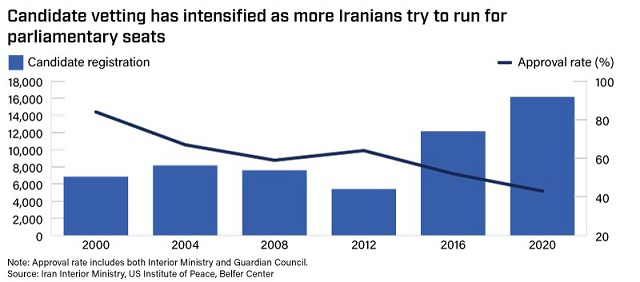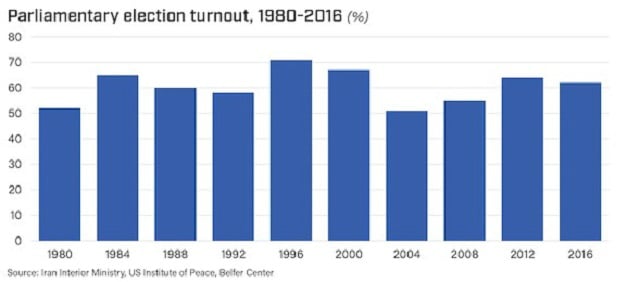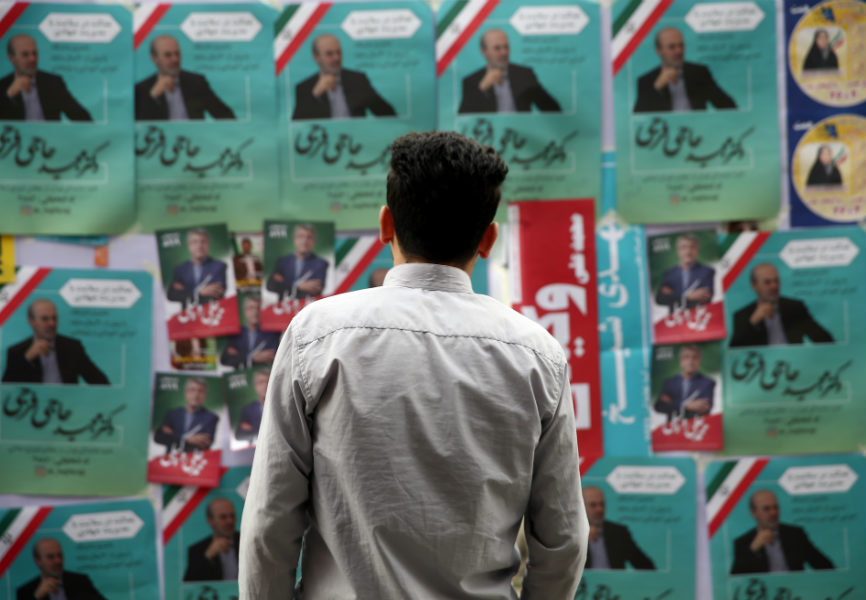Conservatives and hardliners will likely regain control of Iran's parliament in Friday's nationwide elections. The institution is tightly constrained in the Iranian system, and citizens have a very limited choice of candidates owing to extensive vetting. But, as Eurasia Group expert
Henry Rome explains, the race will be a significant barometer of public opinion and set the stage for next year's presidential election.
Are elections in Iran free, or does the government manipulate the outcome?
Elections in Iran are neither genuinely democratic nor completely rigged. The unelected, conservative-dominated Guardian Council decides which candidates are allowed on the ballot, although the extent of its vetting varies from election to election. This year's effort was unprecedented: just 44% of those who registered appear on the ballot, the lowest qualification rate in the Islamic Republic's history. The council purged many moderate or left-wing candidates, including about 90 sitting members of parliament. But even though Iranians' choices are limited, there is little evidence that the government systematically controls election outcomes (with the obvious exception of the 2009 presidential race). Popular participation in elections is an important pillar of the regime's legitimacy, and senior leaders over the past several weeks have launched a massive get-out-the-vote campaign. Iranians' willingness to vote will provide an important barometer of the public mood, even more than the actual results.
 What is the expected outcome of this week's elections?
What is the expected outcome of this week's elections?
Conservatives and hardliners will likely regain control of the parliament for two reasons. First, Guardian Council vetting has been strategic. In addition to barring many reformist and moderate candidates from running, many of those it did approve are competing in heavily conservative districts. According to reformists, as few as 60 seats (out of 290 nationwide) are considered genuinely competitive. Second, turnout will likely be relatively low, as many middle-class Iranians stay home. Parliamentary election turnout has never dipped below 51%, and this year will likely test that limit. Many Iranians are disillusioned with government repression, incompetence, and candidate restrictions, so they do not want to give the Iranian system a vote of confidence in the midst of crisis. Low turnout is highly correlated with conservative victories.
 What would be the impact of a right-wing parliament?
What would be the impact of a right-wing parliament?
Conservatives and hardliners view the parliamentary elections as a golden opportunity lock in their advantage against President Hassan Rouhani and his allies ahead of the 2021 presidential race and the eventual death of Supreme Leader Ali Khamenei. After two terms in charge, Rouhani will not run again, and conservatives feel the wind at their backs. But the Iranian right is highly fragmented, and the parliamentary elections offer the first test of whether its members can work together. Between now and the end of Rouhani's term, a conservative parliament would likely torment the president by blocking legislative initiatives and interrogating and potentially removing ministers. By contrast, a right-wing parliament would give an eventual right-wing president more latitude to accomplish policy objectives.
What would be the impact—if any—on Iran's foreign policy or negotiations with Washington?
Parliament plays a minimal role in Iranian foreign policy, so a big swing in legislative power would not trigger significant shifts in regional or nuclear policy. While the parliament is frequently consulted on major security issues, it has limited capacity to shape outcomes. Along the same lines, the parliament has limited ability to block or initiate diplomatic outreach to Washington. Instead, foreign and security decision-making is centralized in the Supreme National Security Council, with Khamenei as the ultimate arbiter. That said, the election results may have indirect impacts on senior decision-makers in Washington and Tehran. Historically low turnout would send a powerful signal to the regime leadership that popular support is waning, although this probably would not translate in the near term to increased outreach to Washington. Low turnout would also likely embolden US hawks who view the regime as on the brink of collapse, reducing interest in offering Tehran a lifeline through negotiations.
To learn more, read After Trump's bold move, Iran is left with few strategic options, Iranian regime faces new test from demonstrations, and Risk 8: Shia crescendo in our Top Risks for 2020 report.

 A man looks at Iranian parliamentary election campaign posters in Tehran. REUTERS.
A man looks at Iranian parliamentary election campaign posters in Tehran. REUTERS.

